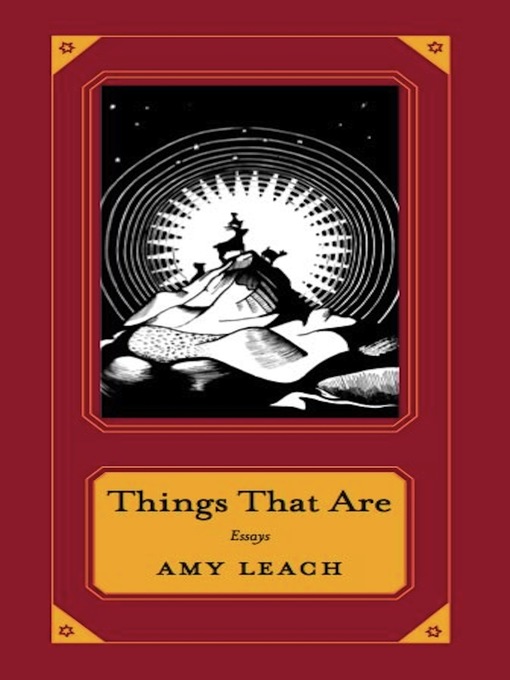
Things That Are
کتاب های مرتبط
- اطلاعات
- نقد و بررسی
- دیدگاه کاربران
نقد و بررسی

April 30, 2012
In her first book, illustrated by Nate Christopherson, Whiting Award–winner Leach has produced a collection of creative nonfiction essays that unfortunately comes across as twee. The recipe: animate inanimate objects, personify animals, add a dash of hypothetical wonder, throw in hard facts, end your essay with a question, and presume connections between the tangible and ephemeral. Repeat. While Leach is able to create moments of verbal delight (“Who can twig the intricated soul of the pirouetting bird?”), her forays into pop philosophy prove less effective: “But... who... who... does not miss everything?” Essays such as “Warbler Delight” are more successful, especially when Leach’s sense of wonder matches the small feats of the subject. However, other diatribes of delight border on the obvious and insubstantial. Allowing for too many authorial indulgences, Leach’s extreme individuality veers into inscrutability. B&w illus. Agent: Jin Auh, the Wylie Agency.

June 15, 2012
Quirky, poetic essays about elements of the natural world. This debut collection by Leach, winner of a Whiting Writers' Award and a Pushcart Prize, explores fantastical and curious subjects pertaining to natural phenomena. Her slim volume is divided into two sections--"Things of Earth" and "Things of Heaven"--containing essays with names such as "Goats, and Bygone Goats," "When Trees Dream of Being Trees" and "Sail On, My Little Honeybee." Each of the essays range from three to seven pages, and they are accompanied by beautiful, original pen-and-ink drawings by Christopherson. Leach's writing, though cerebral, displays her enormous imagination and attention to detail as she poses and attempts to answer such varied questions as how to transport a wave, or considers the upside of life as a goat. The opening line of "Please Do Not Yell at the Sea Cucumber" demonstrates her direct and casual, slyly funny tone: "One nice thing about having bones is that you don't get rerouted every time you run into something." The author's appreciation for absurdity and the joys of wildlife infuses her pieces with a childlike suspension of disbelief; her descriptions strike a balance between imagination and science, with dashes of magical realism, and some of her wording is far more similar to poetry than prose. The work as a whole, despite its occasional similarities to essays by Thoreau, likely won't appeal to many general readers, but for those interested in looking at the natural world through the lens of a fairy tale, this is a bonbon of a book.
COPYRIGHT(2012) Kirkus Reviews, ALL RIGHTS RESERVED.

Starred review from July 1, 2012
The living world has a new and sprightly champion in Leach, winner of a Whiting Writers' Award and a Rona Jaffe Foundation Writers' Award. In her first collection of essays, gracefully illustrated by Nate Christopherson in the mode of Barry Moser and Rockwell Kent, Leach is nimble, precise, dynamic, witty, and metaphysical. She writes of wondrously adaptive goats, penguins enduring blizzards to protect what may well be a stone instead of an egg, and tiny warblers who travel thousands of miles. Leach discerns the pea plant's yearning for connection as it sends out its searching tendrils and compares bamboo-dependent pandas to penitents. In her heady and astute approach to natural history, her disarming concoctions of science and fancy, she is part Diane Ackerman, part Margaret Atwood. Also a bluegrass musician, she writes delectably rhythmic, singing sentences. Here be dragons, water lilies, jellyfish, and spiritual quests. Leach looks to the heavens, too, considering with high imagination the forces that shape stars and galaxies. Even as she fashions a bit of bluesy satire to decry our abuse of nature, Leach is ecstatic in her knowledgeable, resplendent, and exhilarating contemplations of everything from subatomic particles to dust, Spinoza, donkeys, and caterpillars.(Reprinted with permission of Booklist, copyright 2012, American Library Association.)

























دیدگاه کاربران